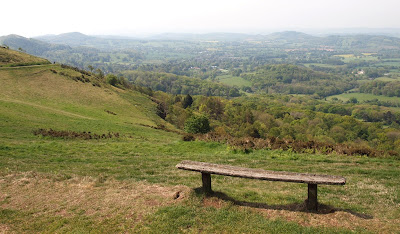I have loved Elgar’s orchestral music since I was a child.
There is something about it that brings a connection with Nature and the
outdoors, summed up by Jerrold Northrop Moore [1]:
The country had filled Elgar’s
music as it had filled the greatest English art. It is a pastoral vision
reaching back through Samuel Palmer and Turner and Constable, through Keats and
Coleridge and Wordsworth.. ..This was the heritage that shaped Elgar and his
music, and that touches his music’s audience still.
It wasn’t until I watched Ken Russell’s BBC documentary [2]
that I knew much about Elgar the man, but that programme set me off reading
biographies and articles. For some reason, I came to view Elgar as a person
whose love of the countryside was similar to my own, although I have no skill
in communicating that love in music, or in any other way for that matter.
In
crude terms, his music “touched my soul” (whatever that means), and it is difficult
for me to listen to some pieces without feeling strong emotions. I’m not
frightened by that, but for many years I put off visiting the Malvern Hills, an
important source of inspiration for Elgar, because I thought I might be disappointed.
Last week, however, I walked up to the top of the Worcestershire Beacon from
the woods surrounding the Hills.
Moore [1] relates a story about Elgar at the end of his
life:
It was the music of the Cello Concerto
that remained with him then. As he lay dying early in 1934, he “rather feebly”
whistled the 9/8 sequence of up-and-down to the friend who had tried to provide
his opera libretto: “If ever you’re walking on the Malvern Hills and hear that,
don’t be afraid. It’s only me.”
I carried this thought with me on my walk and found myself
humming the 9/8 theme, so I was carrying Elgar with me. The walk began with
leafy paths and it then became more open as I climbed, admiring the views all
the while. This is a brief photographic record of the day:
It was exhilarating to stroll up to the Beacon and I can see
how it provided inspiration for the beautiful pastoral music of a great Romantic
like Elgar. At the risk of gaining an entry in “Pseuds Corner”, there was a sense
of being on Earth, but also looking out from above it, at the wide vista on
either side. It was a joyous experience and I can’t understand why I hesitated
walking on the Malvern Hills for so many years.
I’m already looking forward to
going back and the 9/8 theme of the Cello Concerto now brings new memories.
[1] Jerrold Northrop Moore (2004) Elgar: Child of Dreams. London,
Faber and Faber.










No comments:
Post a Comment